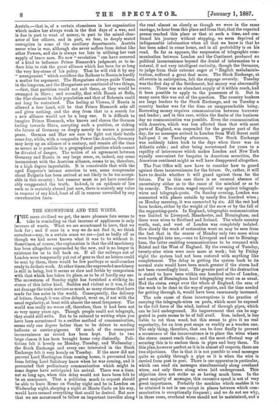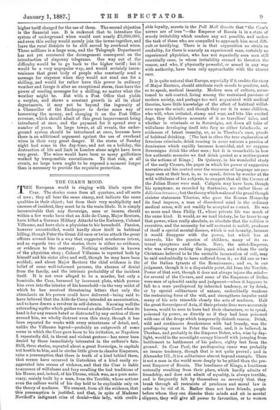THE SNOWSTORM AND THE WIRES. T HE more civilised we get,
the more pleasure fate seems to take in reminding us that increase of appliances is only increase of wants. What we are accustomed to have, that we look for ; and if once in a way we do not find it, we think ourselves—nay, in a certain sense we are—just as badly off as though we had never known what it was to be without it. Sometimes, of course, the explanation is that the old machinery has been altogether superseded by the new, and is no longer in existence for us to fall back on. If all the railways out of London were temporarily put out of gear so that no letters could be sent by them, there would be few postboys or mail-coaches ready to do their work. At other times,the superseded machinery is still in being, but it seems so slow and feeble by comparison with that which has taken its place, as to be of hardly any use. The snowstorm of Sunday night has furnished a striking in- stance of this latter kind. Sudden and violent as it was, it did not damage the train services as much as many storms that have made far less noise in the world. Consequently, the delivery of letters, though it was often delayed, went on, if not with the usual regularity, at least with almost the usual frequency. The world was really no worse off, therefore, than it had been not so very many years ago. Though people could not telegraph, they could still write. But to be reduced to writing when you have been accustomed to a swifter method of communication, seems only one degree better than to be driven to sending balloons or carrier-pigeons. Of much of the consequent inconvenience no record has been kept. But to two large classes it has been brought home very distinctly. Poli- ticians felt it keenly on Monday, Tuesday, and Wednesday ; the Stock Exchange and every one interested in the Stock Exchange felt it very keenly on Tuesday. If the snow did not prevent Lord Hartington from coming home, it prevented him from letting Lord Salisbury know when he was coming, and it prevented that preliminary communication which might in some degree have anticipated his arrival. There was a time, not so long ago, when this delay would not have been felt to be an annoyance. That a politician much in request should be able to leave Rome on Sunday night and be in London on Wednesday night, sleeping a night at Monte Carlo on his way, would have seemed everything that could be desired. But now that we are accustomed to follow an important traveller along the road almost as closely as though we were in the same carriage, to hear from this place and from that, that the expected person reached this place or that at such a time, and con- tinued his journey without stopping, we seem deprived of indispensable information when all that we know is that he has been asked to come home, and in all probability is on his road. So far as appears, the suspension of telegraphic com- munication between London and the Continent produced no political inconvenience beyond the denial of information to a natural, if not very intelligent curiosity, though the Germans, to judge from their extreme anger at " English maladminis- tration, suffered a great deal more. The Stock Exchange, at all events in anticipation, felt the stoppage severely. Tuesday was the first day of the Settlement, but money was abnormally scarce. There was an abundant supply of it within reach, had it been possible to apply to the possessors of it. But in many cases this was out of the question. The country bankers are large lenders to the Stock Exchange, and on Tuesday a country banker was for the time an unapproachable being. Borrowing money requires communication between borrower and lender ; and in this case, within the limits of the business day no communication was possible. Even the communication with America, which was less affected than that with most parts of England, was suspended for the greater part of the day, for no messages arrived in London from Wall Street until half-past 5 on Tuesday afternoon. The Stock Exchange was suddenly taken back to the days when there was no Atlantic cable ; and after being accustomed for years to a rapidity of intercourse which makes London and New York equally convenient for bargains in American securities, the American continent might as well have disappeared altogether.
The Post Office will now have to consider how to guard against these inconveniences for the future. Or, rather, it will have to decide whether it will guard against them for the future. For in this case there is an unusual absence of uncertainty either as to the cause of the mischief or as to its remedy. The storm waged especial war against telegraph- wires and telegraph-posts. On Sunday evening, London was connected with places outside by nearly five hundred wires ; on Monday morning, it was connected by six. All the rest had been broken, either by the weight of the snow or by the fall of the supporting-posts. In England, telegraphic communication was limited to Liverpool, Manchester, and Birmingham, and there were wires to Scotland and Ireland. The whole country south, east, and west of London was completely isolated. How slowly the work of restoration went on may be seen from the fact that in the course of Monday only two more wires were brought into use,—one to Liverpool and one to Birming- ham, the latter enabling communications to be resumed with Bristol and the West of England. By the evening of Tuesday, twenty-nine wires were once more at work ; but by Friday night the system had not been restored with anything like completeness. The delay in getting the system back to its normal state would have been much greater if the storm had not been exceedingly local. The greater part of the destruction is stated to have been within one hundred miles of London, and north of Birmingham local telegraphing went on as usual. Had the storm swept over the whole of England, the area of the work to be done in the way of repairs, and the time needed for getting through it, would have been enormously increased.
The sole cause of these interruptions is the practice of carrying the telegraph-wires on posts, which must be exposed to the full force of the wind, instead of through pipes, which can be laid underground. No improvement that can be sug- gested in posts seems to be of full avail. Iron, indeed, is less liable to rot than wood, but this seems to give it no real superiority, for an iron post snaps as readily as a wooden one. The only thing, therefore, that can be done finally to prevent a recurrence of the inconvenience is to place the wires where the storm cannot reach them ; and the most effectual way of securing this is to enclose them in pipes and bury them. To this plan,however perfect as it is in almost all respects, there are two objections. One is that it is not possible to send messages quite so quickly through a pipe as it is when the wire is carried from post to post. There is one apparatus in particular, which can send six messages simultaneously along overhead wires, and only three along wires laid underground. This objection does not strike us as having much force. In the great majority of messages, this excessive speed is not of very great importance. Probably the machine which enables it to be attained is not in use except in places between which com- munication is exceptionally frequent ; and we do not see why, in these cases, overhead wires should not be maintained, and a higher tariff charged for the use of them. The second objection is the financial one. It is reckoned that to introduce the system of underground wires would cost nearly £3,000,000, and even this outlay would merely join the towns together, and leave the rural districts to be still served by overhead wires. Three millions is a large sum, and the Telegraph Department has not yet recovered the derangement consequent on the introduction of sixpenny telegrams. One way out of the difficulty would be to go back to the higher tariff ; but it would be a very unpopular way, and would certainly incon- venience that great body of people who constantly send a message for sixpence when they would not send one for a shilling, and would far rather have this power in ordinary weather and forego it after an exceptional storm, than have the power of sending messages for a shilling, no matter what the weather might be. But with a Post Office that yields a surplus, and shows a constant growth in all its chief departments, it may not be beyond the ingenuity of a Chancellor of the Exchequer to devise some way of borrowing the money, and charging it on the Post Office revenue, which should admit of this great improvement being introduced at once, and the payment for it spread over a number of years. In large towns, at all events, the under- ground system should be introduced at once, because here there is an additional argument against the use of overhead wires in their very great danger. If the storm of Sunday night bad come in the day-time, and not on a holiday, the destruction of life and limb in London alone might have been very great. The wires would have been so many guillotines worked by irresponsible executioners. To that risk, at all events, no large town ought to be exposed a moment longer than is necessary to provide the requisite protection.















































 Previous page
Previous page